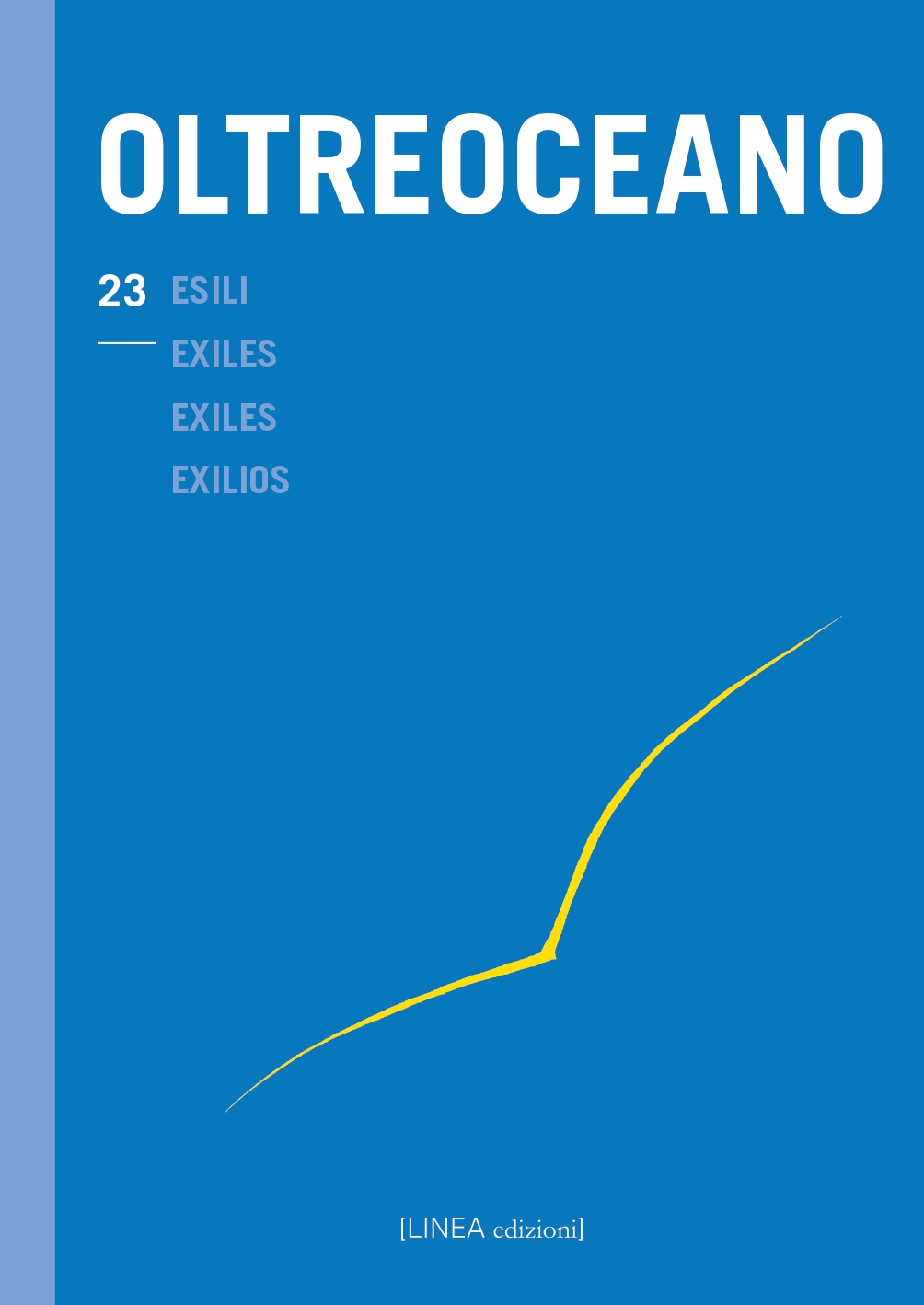Pragmatic analysis of Invisibles. Voces de un trozo invisible de este mundo by Juan Diego Botto
DOI:
https://doi.org/10.53154/Oltreoceano110Keywords:
Exile, Emigration, Pragmatics, Analysis, Juan Diego BottoAbstract
The aim of this article is to carry out a pragmatic analysis of Juan Diego Botto's play Invisibles. Voces de un trozo invisible de este mundo, in which the author confronts two themes that many people must face for different reasons: exile (which he himself suffered) and emigration. In our case, we will focus more on the former and comment on the types of exile that exist, as well as some related words such as deportation, expatriation, expulsion, or estrangement, etc. In fact, although in dictionaries they appear as synonyms, but they are not exactly the same because exile is the separation from the land where one lives, while banishment is the result of a penalty imposed, usually by the State, and whose purpose is the expulsion of a person from a place or territory for having committed a crime, it can be temporary or sine die (there is also talk of expulsion and there are well-known cases in Chile –they chose the place to go –and Argentina– expulsion of foreigners convicted of a crime in that country, provided that they had served half of their sentence and without open legal proceedings–). Another type of separation was caused by Italian fascism whereby many intellectuals were confined or forced to live in southern areas or on Mediterranean islands. Today, two writers live under escort outside their respective countries: Salman Rushdie and Roberto Saviano. On the other hand, one people that has experienced expulsion, exodus and diaspora is the Jewish people. The expulsion, during the reign of the Reyes Católicos (with Felipe III, the expulsion of the moriscos or descendants of Muslims), the exodus, after the Second World War and the diaspora when this people voluntarily disintegrated outside the borders of Palestine. Methodologically, with a Pragmatic approach, we will examine the illocutionary force of some fragments, paying special attention to the satisfactory respect of Grice's maxims or other of his lines of research such as Austin's speech acts, etc.
Downloads
References
ACNUR (2024): Exilio y destierro ¿qué significan? Recuperado de https://eacnur.org/es/exilio-y-destierro-que-significan (Visitado el 02/05/2024).
Botto, J.D. (2013): Invisibles. Voces de un trozo invisible de este mundo. Madrid: Espasa.
Canelo, B. (2007): Cuando el exilio fue confinamiento. Argentinos en Suecia. En P. Yankelevich & S. Jensen (Eds.): Exilios. Destinos y experiencias bajo la dictadura militar (pp. 103-137). Buenos Aires: El Zorzal.
CVC (2024): Biblioteca del Exilio. Biblioteca Virtual Miguel de Cervantes. Recuperado de https://www.cervantesvirtual.com/portales/biblioteca_del_exilio/ (Visitado el 02 y 03/05/2024.
Escandell, M. V. (2006): Introducción a la Pragmática, 1996. Barcelona: Ariel Lingüística.
Esteva Fabregat, C. (2018): Exilio y desexilio: experiencia de una antropología. México-Madrid-Barcelona. Scripta Nova. Arxiu d’Etnografia de Catalunya, 19, pp. 25-79.
Fuentes Rodríguez, C. (2010): La gramática de la cortesía en español/LE. Madrid: Arco/Libros.
Garrido Caballero, M. (2022): El exilio infantil de la Guerra Civil española en la URSS y México. Ayuda internacional, experiencias de vida y legados. El Futuro del Pasado, 13, pp. 421-450.
Institución Naves Matadero (2014): Programación de Un trozo invisible de este mundo. Recuperado de https://www.mataderomadrid.org/programacion/un-trozo-invisible-de-este-mundo (Visitado el 02/05/2024).
Levi, C. (1945): Cristo si è fermato a Eboli. Torino: Einaudi.
Nácar-Colunga (1966): Lamentaciones de Jeremías. Sagrada Biblia (pp. 1000-1005). Madrid: Biblioteca de Autores Cristianos (BAC).
Paglieri F. & Castelfranchi, C. (2008): Decidere il futuro: scelta intertemporale e teoria degli scopi. Giornale italiano di psicologia, XXXV, 4, pp. 739-771.
RAE (Actualización 2023): Diccionario de la lengua española (DLE). Recuperado de https://dle.rae.es/ (Visitado en diferentes ocasiones).
Universidad de la Rioja (2024): Base de datos bibliográfica. Dialnet. Recuperado de https://dialnet.unirioja.es/buscar/documentos?querysDismax.DOCUMENTAL_TODO=exilio (Visitado en diferentes ocasiones).
Downloads
Published
How to Cite
Issue
Section
License

This work is licensed under a Creative Commons Attribution-NonCommercial-ShareAlike 4.0 International License.
The authors undertake to comply with the following conditions, which are considered accepted at the time of submission of their contributions.
The sending of a text implies that it is unpublished and not submitted to be published elsewhere.
1. If accepted, the author shall confer on the publisher the right to publish and distribute it both in paper form and in the online electronic edition. The published articles will be downloadable and made available in open access.
2. Provided that it correctly indicates that the first publication took place in the journal Oltreoceano. Rivista sulle migrazioni the author has the right to: a) reproduce the article in separate extracts or collected in a volume; b) publish the article on their personal website or teaching site provided that these sites are of a non-commercial nature; c) deposit the article in online archives of a non-commercial nature, linked to the institution they belong to or as part of projects for the non-commercial dissemination and open access of scientific works.
The use of contributions by third parties, for commercial or otherwise unauthorized purposes, is not allowed. The publisher declines all responsibility for the unauthorized use of the material published in the journal.












